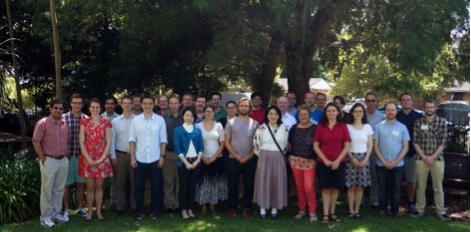Sydney, Australia, 25-27 February 2015
An article on the outcome of the Workshop is published in the Bulletin of the Australian Meteorological and Oceanographic Society (AMOS) Vol. 28, page 45. Find the AMOS Bulletin here.

Observations are the key foundation for understanding long-term climate variability and change but are often not well-constrained. Critical gaps exist in the amount, quality, consistency and availability of observations, especially with respect to extremes. The current suite of climate extremes datasets are inadequate to properly assess climate variability and change, and to underpin detection and attribution studies and model evaluation. This is due to data limitations (in time and space), differences in how extremes are defined, the spatial representativeness of point-based measurements, scaling issues between observations, and models and uncertainties in variable estimates from satellite retrievals. There is a need to collate and better disseminate data from all existing sources that are relevant for extremes, and to identify regions and time periods where we have the ability to fill in gaps.
A workshop is therefore proposed that is motivated primarily by the need to address Q1 of the Grand Challenge on Climate Extremes (see white paper) “How can we improve the collation, dissemination and quality of observations needed to assess extremes and what new observations do we need?”. This workshop will help address Q2: “Can models be further improved to better simulate, predict and project extremes?”, the answer to which will require intercomparison of existing data products and ways to address scaling issues between observations and models. The workshop will also help to inform Q6: “How has drought changed in the past and what were the causes, and how will it change in the future?”, since existing observed data uncertainties are key to addressing this question. Q4 and Q5 will be addressed as data limitations that are hampering existing attribution studies.
- Title of Workshop: Data Requirements to Address the WCRP Grand Challenges on Weather and Climate Extremes
- Venue: University of New South Wales, Sydney Australia
- Dates: 25-27 February 2015
Nature and Format of Meeting
The workshop will have the following sessions reflecting our main goals:
•Day 1: Would cover an overview of existing observed datasets that can be used for extremes analysis (in situ and satellite-based) and what new observations/indices are needed to address the Grand Challenge.
•Day 2: Covers derived products to monitor floods, droughts, heatwaves and tropical cyclones in addition to new international data initiatives and interconnections to model evaluation such as requirements for CMIP6 in terms of extremes.
•Day 3: Discusses data issues and requirements for underpinning observations for Detection & Attribution and fast-track attribution. Also “Next Steps” with clear plans and timeline for the way forward
Each day would be a mixture of short overview talks on specific topics (20 mins), breakout sessions and longer discussions including a final day discussion and concrete outcomes on coordination, dissemination and implementation plans for extremes.
Outcome of the Workshop
By Lisa Alexander, Climate Change Research Centre and ARC Centre of Excellence for Climate System Science, University of New South Wales, Sydney, Australia
(Bulletin of the Australian Meteorological and Oceanographic Society (AMOS) Vol. 28, page 45)
The World Climate Research Programme (WCRP) has laid down a set of six Grand Science Challenges that the climate research community is tasked with addressing over the coming years. These represent some of the most important yet challenging scientific questions that if answered would address current research gaps and ultimately help provide more useful “actionable information” for decision makers. One of these Grand Challenges is the WCRP Grand Challenge on Understanding and Predicting Weather and Climate Extremes (‘Extremes Grand Challenge’).
The Extremes Grand Challenge produced a White Paper (https://www.wcrp-climate.org/images/documents/grand_challenges/GC_Extremes_v2.pdf) in 2014 that posed eight ‘Grand Science’ questions to help meet the challenge presented by WCRP. One of these questions, “How can we improve the collation, dissemination and quality of observations needed to assess extremes and what new observations do we need?”, was the main motivation for a workshop that was held at the University of New South Wales in Sydney from 25th – 27th February 2015. This invitation-only workshop brought together 33 climate data and extremes experts from 11 countries, including representation from several of the large global data centres; the National Climatic Data Center (USA), Global Precipitation Climatology Centre (Germany) and Met Office Hadley Centre (UK).
Over the 3-day workshop, talks covered an overview of existing observed datasets that are commonly used for extremes analysis in addition to what new observations/indices would be needed to address the Extremes Grand Challenge. New international data initiatives were discussed with respect to how these could be better coordinated to avoid overlap and maximize research outcomes. Interconnections to model evaluation of extremes such as requirements for CMIP6 were also discussed, as were the requirements for the underpinning observations needed for detection and attribution (D&A) and attribution of climate extremes (ACE) analyses. Through break-out sessions we identified limitations and gaps in existing datasets, new observations that would be needed and how to make best use of observations for monitoring and model evaluation. On the final day of the workshop we were tasked with setting out a clear plan of ‘next steps’ and deliverables for the coming years which included amongst other things a guidance document on how datasets should/should not be used for extremes, a best practice guidance paper for gridding extremes datasets, and an intercomparison of existing extremes products.
Other highlights of the workshop included a “Student Bakeoff” where each workshop participant got to vote at morning and afternoon teas (congratulations to Matt Lipson, Stefan Contractor for the delicious winning entries and Shirley Qin for excellent organization) and an Extreme Trivia evening (see Fiona’s article).
For more information on the Extremes Grand Challenge see https://www.wcrp-climate.org/grand-challenges/gc-extreme-events.

